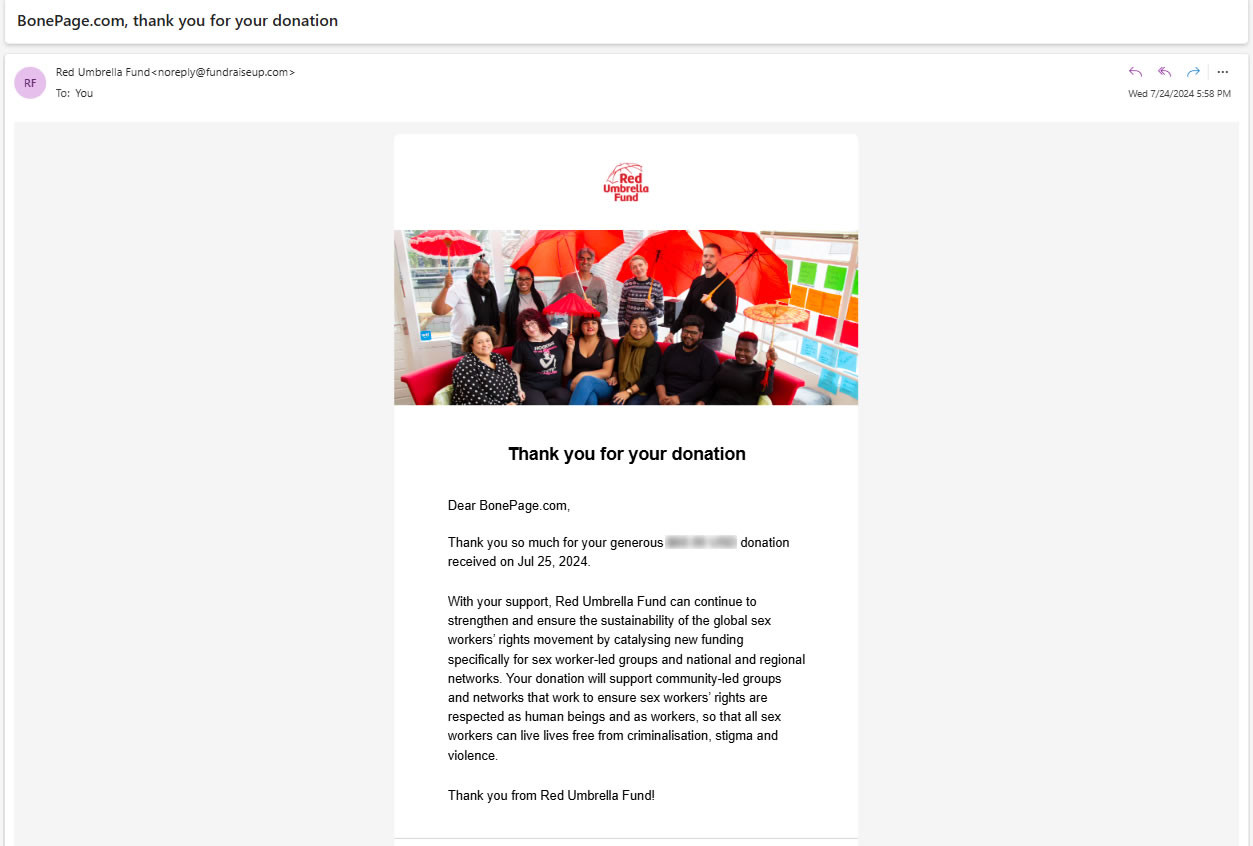Decriminalize Sex Work
Decriminalize Sex Work by Sienna Mitchell, BonePage.com Staff Reporter
 BonePage supports the movement to decriminalize sex work. Coming from a background in the sex work industry as a webcam model, I have unique experience in this subject. Many of my friends are involved in various aspects of sex work. Sex workers often find themselves victims of heinous crimes such as kidnapping, assault, and human trafficking. They deserve protection and respect, not prosecution. Our stance is clear: decriminalization is critical for the safety and dignity of all sex workers.
BonePage supports the movement to decriminalize sex work. Coming from a background in the sex work industry as a webcam model, I have unique experience in this subject. Many of my friends are involved in various aspects of sex work. Sex workers often find themselves victims of heinous crimes such as kidnapping, assault, and human trafficking. They deserve protection and respect, not prosecution. Our stance is clear: decriminalization is critical for the safety and dignity of all sex workers.
The argument for decriminalizing sex work is compelling. At its core, it is a matter of basic human rights and public health. Criminalization pushes sex work underground, making it more difficult for workers to report crimes committed against them for fear of legal repercussions. This underground status also limits access to health care and social services, exacerbating the risks of violence, sexually transmitted infections, and mental health issues.
Current laws often penalize sex workers more harshly than their clients. This disparity in prosecution means that those most vulnerable—typically women, LGBTQ+ people, and people of color—face the brunt of legal consequences. Meanwhile, customers, or “Johns,” often escape with zero or minimal repercussions. This imbalance fails to address the root causes of exploitation and also reinforces systemic inequalities. It is clearly an ineffective system.
Who are Sex Workers?
Sex workers encompass a diverse group of people who provide personal companionship and/or sex services, including personal escorts and sex providers, strippers, massage and body rub providers, dominatrixes, porn actors, webcam models, and phone sex workers. While quite varied, these providers share common threads of stigmatization and legal challenges that place them at risk. The criminalization of sex work not only perpetuates this stigma but also exposes workers to greater harm.
What Do Sex Workers Contribute to Society?
 It’s important to recognize that sex workers make valuable contributions to our communities in various ways. Despite the stigma often associated with their profession, many sex workers are actively engaged in promoting companionship, health, safety, and well-being within their communities.
It’s important to recognize that sex workers make valuable contributions to our communities in various ways. Despite the stigma often associated with their profession, many sex workers are actively engaged in promoting companionship, health, safety, and well-being within their communities.
Sex workers often play a crucial role in public health initiatives. Many are involved in peer education programs, distributing condoms, and providing information about safe sex practices, which helps reduce the spread of sexually transmitted infections. Organizations run by and for sex workers often lead these efforts, creating a sense of community and mutual support.
Sex workers contribute to the economy. From renting apartments and purchasing goods to paying taxes, their economic activities support local businesses and contribute to overall economic growth. The financial independence gained through sex work allows many individuals to support their families, pursue education, and invest in their futures.
Many sex workers are active in advocacy and social justice efforts. They work tirelessly to challenge stereotypes, fight for legal rights, and support others in their community. This activism not only benefits sex workers but also promotes broader human rights and equality.
The contributions of sex workers extend to providing emotional support and companionship. For many clients, sex workers offer a non-judgmental space to explore intimacy, which can be profoundly healing and beneficial. Many customers will remark on the compassion and empathy that some sex workers bring to their profession.
What About Criminal Acts Associated with Sex Work?
 While we firmly advocate for the decriminalization of sex work, we want to make it unequivocally clear that we do not condone any of the harmful criminal activities that may surround the industry. Human trafficking, assaults, coercion, forced drug use, and other forms of exploitation and violence are not to be tolerated in our society.
While we firmly advocate for the decriminalization of sex work, we want to make it unequivocally clear that we do not condone any of the harmful criminal activities that may surround the industry. Human trafficking, assaults, coercion, forced drug use, and other forms of exploitation and violence are not to be tolerated in our society.
Decriminalizing sex work does not mean endorsing these criminal acts. Quite to the contrary, it allows us to distinguish between consensual sex work and criminal exploitation, enabling law enforcement to focus their efforts on combating real crimes. By decriminalizing sex work, we can create a safer environment where sex workers can operate without fear, and where criminal activities are more easily identified and prosecuted.
Our support for sex workers goes hand-in-hand with our commitment to fighting human trafficking and all forms of abuse. We have been very vocal about this and we believe that through decriminalization, we can protect the rights and safety of sex workers while ensuring that those who perpetrate violence and exploitation are held accountable.
The Case to Decriminalize Sex Work
Harmful Impacts of Criminalization
Laws that criminalize sex work have severe, negative impacts:
 Increases Vulnerability to Violence: Sex workers cannot safely report abuse or seek help from law enforcement, leaving them at the mercy of violent clients and traffickers.
Increases Vulnerability to Violence: Sex workers cannot safely report abuse or seek help from law enforcement, leaving them at the mercy of violent clients and traffickers.- Limited Access to Health Services: Fear of arrest discourages sex workers from accessing necessary medical care, leading to poorer health outcomes.
- Perpetuates Economic Insecurity: Criminal records hinder future employment opportunities, trapping individuals in cycles of poverty, abuse and marginalization.
- Creates Distrust of Authorities: When the legal system criminalizes their work, sex workers are less likely to trust or cooperate with police, making it harder to combat actual trafficking, exploitation and other criminal activities that must be addressed.
Emerging Movements to Decriminalize Sex Work
 Around the world, attitudes towards sex work are shifting. Some countries and regions have started to recognize the benefits of decriminalization. For instance:
Around the world, attitudes towards sex work are shifting. Some countries and regions have started to recognize the benefits of decriminalization. For instance:
- New Zealand: In 2003, New Zealand decriminalized sex work through the Prostitution Reform Act, leading to significant improvements in worker safety and health.
- Australia: Various states, such as New South Wales, have adopted decriminalization models, demonstrating positive outcomes in public health and safety.
- United States: While the majority of states still criminalize sex work, there is a growing movement advocating for change. Cities like San Francisco have seen increasing support for decriminalization, with organizations working tirelessly to shift public perception and influence policy.
Advocates for Sex Worker Rights
Several organizations are leading the charge to decriminalize sex work and protect the rights of those within the industry. We encourage you to visit their websites and learn about what they are doing to decriminalize sex work. Notable groups include:
- The Sex Workers Outreach Project (SWOP-USA): A national social justice network dedicated to the fundamental human rights of sex workers. Website: www.swopusa.org
- The Global Network of Sex Work Projects (NSWP): This organization advocates for the health and human rights of sex workers at an international level. Website: www.nswp.org
- The Red Umbrella Fund: A global fund that supports the rights of sex workers through financial and advocacy assistance. Website: www.redumbrellafund.org
- The Cupcake Girls: Support to those involved in the sex industry, along with outreach, advocacy, and services for those affected by sex trafficking. www.thecupcakegirls.org
- Decriminalize Sex Work: Works to improve policies related to all forms of sex work and to end the prohibition of consensual adult prostitution in the U.S. www.decrimnalizesex.work
Donation To Support Decriminalization of Sex Work

BonePage.com has made a financial contribution in support of The Red Umbrella Fund‘s efforts to decriminalize sex work around the world. These donations provide flexible core funding to sex worker-led organizations and networks worldwide. Perhaps you can help by joining their efforts or making a financial contribution to the organization of your choice.
Conclusion
The movement to decriminalize sex work is not just a policy change. It’s a necessary step toward justice and the protection of basic human rights. At BonePage.com, we urge policymakers, advocates, and the public to support this critical movement. By decriminalizing sex work, we can reduce harm, promote health, and ensure that all individuals, regardless of their occupation, are treated with dignity and respect. Let’s stand together to create a safer, fairer world for everyone.
Sienna Mitchell, First Amendment Reporter
 Sienna Mitchell is a staff writer for BonePage.com adult classifieds. She is a talented and experienced First Amendment reporter and published author based in Phoenix, Arizona. With a passion for uncovering stories and exposing injustices within the adult entertainment community, Sienna has made a name for herself as a reporter who focuses on the intersection of first amendment issues and the adult entertainment industry.
Sienna Mitchell is a staff writer for BonePage.com adult classifieds. She is a talented and experienced First Amendment reporter and published author based in Phoenix, Arizona. With a passion for uncovering stories and exposing injustices within the adult entertainment community, Sienna has made a name for herself as a reporter who focuses on the intersection of first amendment issues and the adult entertainment industry.
Sienna’s prior experience as a webcam model gives her a unique perspective on the challenges faced by sex workers and adult performers. Her experience and extensive knowledge of the adult industry makes her an authoritative voice on the subject. Sienna Mitchell is a skilled reporter whose work is making a difference in the adult entertainment industry.
Contact Sienna Mitchell: SiennaMitchell@teamdnp.com
Link to Sienna’s Bio: Sienna Mitchell


3 thoughts on “Decriminalize Sex Work”